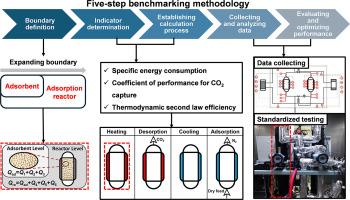Benchmarking heat-driven adsorption carbon pumps (HACP): A thermodynamic perspective
引用次数: 0
Abstract
Benchmarking is pivotal in standardizing industrial devices, leading to notable performance enhancements in fields such as heating pump air conditioning, photovoltaic devices, and more. The significance of treating the CO2 capture system in small/medium size was emphasized in this work as a standalone device from a thermodynamic perspective, which facilitates the creation of a comprehensive benchmarking methodology. In this study, we studied the heat-driven adsorption carbon pump (HACP) as a typical case for benchmarking. The benchmarking methodology proposed is structured through a five-step process: defining boundaries, determining indicators, establishing calculation processes, collecting and analyzing data, and ultimately evaluating and optimizing performance. By utilizing thermodynamic principles, the energy efficiency of HACP devices was assessed. Through the combination of standardized tests and theoretical calculations, this work enables a quantitative evaluation of energy consumption and the thermodynamic perfection of specific HACP devices.

热驱动吸附碳泵(HACP)的基准:热力学视角
基准测试对于工业设备的标准化至关重要,可显著提高暖泵空调、光伏设备等领域的性能。本研究从热力学角度强调了将中小型二氧化碳捕集系统作为独立设备处理的重要性,这有助于建立全面的基准测试方法。在这项研究中,我们将热驱动吸附碳泵(HACP)作为一个典型的基准案例进行研究。我们提出的基准测试方法分为五个步骤:定义边界、确定指标、建立计算流程、收集和分析数据,以及最终评估和优化性能。利用热力学原理,对 HACP 设备的能效进行了评估。通过将标准化测试和理论计算相结合,这项工作能够对特定 HACP 设备的能耗和热力学完美性进行量化评估。
本文章由计算机程序翻译,如有差异,请以英文原文为准。
求助全文
约1分钟内获得全文
求助全文

 求助内容:
求助内容: 应助结果提醒方式:
应助结果提醒方式:


